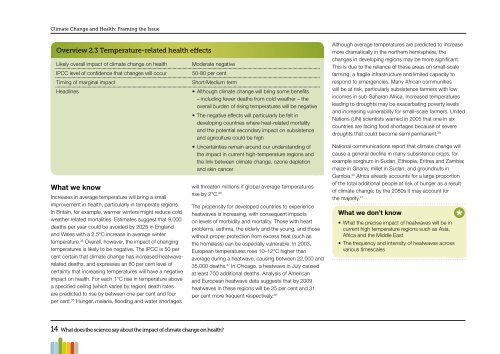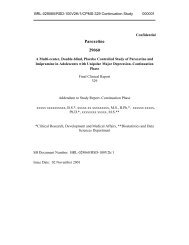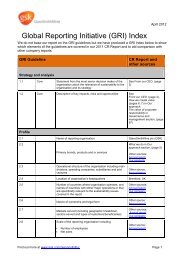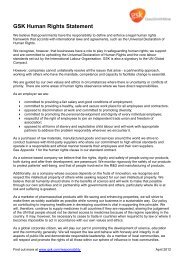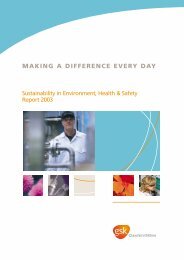Climate Change and Health: Framing the issue
Climate Change and Health: Framing the issue
Climate Change and Health: Framing the issue
Create successful ePaper yourself
Turn your PDF publications into a flip-book with our unique Google optimized e-Paper software.
<strong>Climate</strong> <strong>Change</strong> <strong>and</strong> <strong>Health</strong> <strong>Health</strong>: <strong>Framing</strong> Paper <strong>the</strong> Issue<br />
Overview 2.3 Temperature-related health effects<br />
Likely overall impact of climate change on health Moderate negative<br />
IPCC level of confidence that changes will occur 50-80 per cent<br />
Timing of marginal impact Short/Medium term<br />
Headlines • Although climate change will bring some benefits<br />
– including fewer deaths from cold wea<strong>the</strong>r – <strong>the</strong><br />
overall burden of rising temperatures will be negative<br />
• The negative effects will particularly be felt in<br />
developing countries where heat-related mortality<br />
<strong>and</strong> <strong>the</strong> potential secondary impact on subsistence<br />
<strong>and</strong> agriculture could be high<br />
• Uncertainties remain around our underst<strong>and</strong>ing of<br />
<strong>the</strong> impact in current high-temperature regions <strong>and</strong><br />
<strong>the</strong> link between climate change, ozone depletion<br />
<strong>and</strong> skin cancer<br />
What we know<br />
Increases in average temperature will bring a small<br />
improvement in health, particularly in temperate regions.<br />
In Britain, for example, warmer winters might reduce cold<br />
wea<strong>the</strong>r related mortalities. Estimates suggest that 9,000<br />
deaths per year could be avoided by 2025 in Engl<strong>and</strong><br />
<strong>and</strong> Wales with a 2.5°C increase in average winter<br />
temperature. 34 Overall, however, <strong>the</strong> impact of changing<br />
temperatures is likely to be negative. The IPCC is 50 per<br />
cent certain that climate change has increased heatwaverelated<br />
deaths, <strong>and</strong> expresses an 80 per cent level of<br />
certainty that increasing temperatures will have a negative<br />
impact on health. For each 1°C rise in temperature above<br />
a specified ceiling (which varies by region) death rates<br />
are predicted to rise by between one per cent <strong>and</strong> four<br />
per cent. 35 Hunger, malaria, flooding <strong>and</strong> water shortages<br />
014Introduction<br />
14 What does <strong>the</strong> science say about <strong>the</strong> impact of climate change on health?<br />
will threaten millions if global average temperatures<br />
rise by 2°C. 36<br />
The propensity for developed countries to experience<br />
heatwaves is increasing, with consequent impacts<br />
on levels of morbidity <strong>and</strong> mortality. Those with heart<br />
problems, asthma, <strong>the</strong> elderly <strong>and</strong> <strong>the</strong> young, <strong>and</strong> those<br />
without proper protection from excess heat (such as<br />
<strong>the</strong> homeless) can be especially vulnerable. In 2003,<br />
European temperatures rose 10–12°C higher than<br />
average during a heatwave, causing between 22,000 <strong>and</strong><br />
35,000 deaths. 37 In Chicago, a heatwave in July caused<br />
at least 700 additional deaths. Analysis of American<br />
<strong>and</strong> European heatwave data suggests that by 2009<br />
heatwaves in <strong>the</strong>se regions will be 25 per cent <strong>and</strong> 31<br />
per cent more frequent respectively. 38<br />
Although average temperatures are predicted to increase<br />
more dramatically in <strong>the</strong> nor<strong>the</strong>rn hemisphere, <strong>the</strong><br />
changes in developing regions may be more significant.<br />
This is due to <strong>the</strong> reliance of <strong>the</strong>se areas on small-scale<br />
farming, a fragile infrastructure <strong>and</strong> limited capacity to<br />
respond to emergencies. Many African communities<br />
will be at risk, particularly subsistence farmers with low<br />
incomes in sub-Saharan Africa. Increased temperatures<br />
leading to droughts may be exacerbating poverty levels<br />
<strong>and</strong> increasing vulnerability for small-scale farmers. United<br />
Nations (UN) scientists warned in 2005 that one in six<br />
countries are facing food shortages because of severe<br />
droughts that could become semi permanent. 39<br />
National communications report that climate change will<br />
cause a general decline in many subsistence crops, for<br />
example sorghum in Sudan, Ethiopia, Eritrea <strong>and</strong> Zambia;<br />
maize in Ghana; millet in Sudan; <strong>and</strong> groundnuts in<br />
Gambia. 40 Africa already accounts for a large proportion<br />
of <strong>the</strong> total additional people at risk of hunger as a result<br />
of climate change; by <strong>the</strong> 2080s it may account for<br />
<strong>the</strong> majority. 41<br />
What we don’t know<br />
• What <strong>the</strong> precise impact of heatwaves will be in<br />
current high temperature regions such as Asia,<br />
Africa <strong>and</strong> <strong>the</strong> Middle East<br />
• The frequency <strong>and</strong> intensity of heatwaves across<br />
various timescales<br />
*


